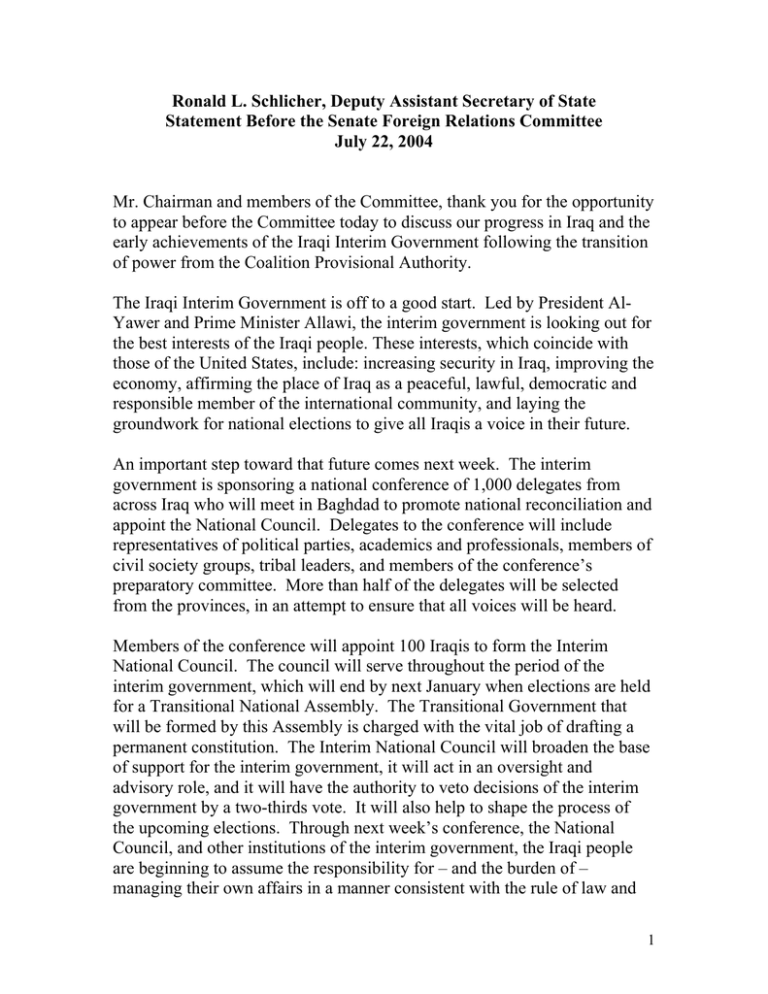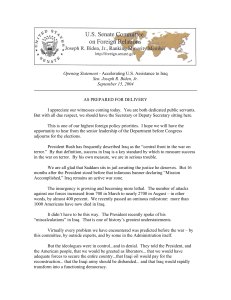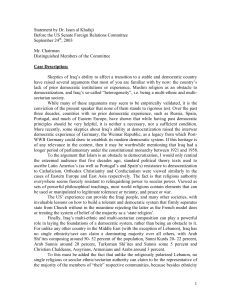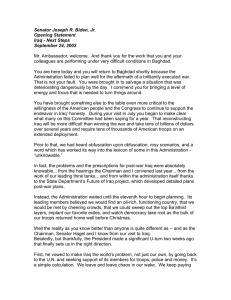Ronald L. Schlicher, Deputy Assistant Secretary of State
advertisement

Ronald L. Schlicher, Deputy Assistant Secretary of State Statement Before the Senate Foreign Relations Committee July 22, 2004 Mr. Chairman and members of the Committee, thank you for the opportunity to appear before the Committee today to discuss our progress in Iraq and the early achievements of the Iraqi Interim Government following the transition of power from the Coalition Provisional Authority. The Iraqi Interim Government is off to a good start. Led by President AlYawer and Prime Minister Allawi, the interim government is looking out for the best interests of the Iraqi people. These interests, which coincide with those of the United States, include: increasing security in Iraq, improving the economy, affirming the place of Iraq as a peaceful, lawful, democratic and responsible member of the international community, and laying the groundwork for national elections to give all Iraqis a voice in their future. An important step toward that future comes next week. The interim government is sponsoring a national conference of 1,000 delegates from across Iraq who will meet in Baghdad to promote national reconciliation and appoint the National Council. Delegates to the conference will include representatives of political parties, academics and professionals, members of civil society groups, tribal leaders, and members of the conference’s preparatory committee. More than half of the delegates will be selected from the provinces, in an attempt to ensure that all voices will be heard. Members of the conference will appoint 100 Iraqis to form the Interim National Council. The council will serve throughout the period of the interim government, which will end by next January when elections are held for a Transitional National Assembly. The Transitional Government that will be formed by this Assembly is charged with the vital job of drafting a permanent constitution. The Interim National Council will broaden the base of support for the interim government, it will act in an oversight and advisory role, and it will have the authority to veto decisions of the interim government by a two-thirds vote. It will also help to shape the process of the upcoming elections. Through next week’s conference, the National Council, and other institutions of the interim government, the Iraqi people are beginning to assume the responsibility for – and the burden of – managing their own affairs in a manner consistent with the rule of law and 1 with the obligations of a fully sovereign member of the international community. It is clear that Iraqis are anxious to assume that responsibility. They do not hesitate to say so; in fact they are vigorously exercising their newly-won right of free speech in community meetings, cafes, mosques, and farm fields up and down the Tigris and Euphrates. And in doing so, the Iraqi people have made clear that their top concern is the restoration of security and the defeat of the insurgents and terrorists who want to undermine stability and the path forward to reconstruction and full democracy. In response, while the interim government has taken a hard line against violence, it is also reaching out to all Iraqis willing to participate peacefully in the political process. For example, there are reports that the interim government is considering issuance of an amnesty law that would provide an opportunity to those who wish to give up the path of violence and join the supporters of a free and democratic Iraq. We welcome these efforts at national reconciliation; and any final decision on an amnesty will be an Iraqi decision. However, we have been clear with the Interim Government that we believe that those responsible for causing the death of Iraqi civilians and security forces or members of the U.S. or Coalition armed forces should face justice. Even as it reaches out to Iraqis willing to participate in the political process, the interim government has aggressively attacked crime and terrorism. Prime Minister Allawi has issued a decree authorizing the interim government to exercise certain limited powers in particular emergency situations in order to enhance the ability of the government to meet the demands of Iraqis for safer streets. In recognition of the lessons learned from the Saddam era, the decree includes procedural safeguards that will prevent it from being abused to infringe on the civil rights Iraqis are only now beginning to enjoy. In addition, the interim government has assumed legal custody of Saddam Hussein and some of his top advisors. Iraqis themselves are taking responsibility for the judicial process to hold them accountable for the atrocities they committed against the Iraqi people. The open and fair trials of Saddam Hussein and his supporters and staff in Iraq will be a vital part of the reconciliation process that is necessary to move beyond the traumas of the past and begin unifying society under the rule of law. 2 U.S. Embassy officials consulted on these issues when asked by the Interim Government, as part of our commitment to support that government with advice and assistance. During these consultations, the Iraqi authorities have made clear that they want the Multi-National Forces in Iraq (MNF-I) – ours and those of our partners – to work with them to provide basic security until Iraqis can do the job themselves. The multinational forces are doing just that in a manner consistent with the exercise of full sovereignty by the Iraqi government. But the ultimate success of the interim government depends on the support of the Iraqi people, and Iraqis are showing that they are behind it. Throughout Iraq, courageous citizens are taking positions at all levels of their country as cabinet ministers, local administrators, council members, and civil servants. All too often we hear of an attack against government officials, including many of whom those of us who served in Iraq are privileged to call friends. But the Iraqis do not back down. Young men continue to line up outside recruiting stations to join the security forces. They are being attacked, and many have been killed, but they continue to step forward. They understand that their future is on the line, and with our help, they are willing to fight for it. Despite the difficult security environment, important progress has been made toward rebuilding Iraq. The relief and reconstruction of Iraq is an extraordinarily ambitious project after the degradation of that country’s infrastructure over the past 25 years. Of the total $21 billion in 2003 and 2004 assistance, $8.3 billion has been obligated. These funds have helped to sustain economic activity – and hope – since the first days of the war. This money is making a tangible difference in the lives of Iraqis. More than 30,000 Iraqis are now working as a result of our assistance. We have immunized over three million children under the age of five, vaccinated 700,000 pregnant women, and updated the skills of 2,500 primary health care providers and 700 physicians. Hospitals and clinics have been refurbished; medicines are being more equitably distributed. Schools are being repaired, teachers trained, and new curricula developed. Students are now free to exercise critical thought and learn new ideas. Attendance in the 2003-2004 school year was as high as, or higher, than pre- 3 war levels. Over eight million new textbooks have been distributed around the country. Notwithstanding the periodic attacks on pipelines, average daily oil production and exports have nearly returned to pre-war levels . Daily megawatt hours of electricity produced countrywide are averaging the levels reached this time last year and they, too, are rising despite attacks. And now, with the interim government in place and a U.S. Embassy team on the ground, we are consulting more closely with the Iraqis about their reconstruction priorities, and reviewing the original spending plan for our assistance to make sure it accords with emerging needs and priorities. Under Ambassador Negroponte's leadership, the Iraq Reconstruction and Management Office (IRMO) and the Embassy's Country Team are reviewing current assistance plans. Ambassador William Taylor, who in September will take over as the head of IRMO, is on the ground in Baghdad to help lead the review. We anticipate the initial work will be completed by the end of July. The new team on the ground in Baghdad will seek to assure that our allocations and commitments of resources track with evolving Iraqi needs and support the efforts of the interim government to establish security, prosperity and democratic practices. We look forward to sharing with you the results of this review. Our assistance remains vital to the government, which is committed to the modernization of Iraq’s economy and to establishing the services and institutions that will significantly raise the standard of living for all Iraqis. In fact, the standard of living has already shown signs of improvement. Shops are full of consumer goods that were unavailable last year, and with household income growing and inflation at reasonable levels for a postconflict economy, many Iraqis are beginning to see an improvement in their lives. We estimate that per capita household income will likely double this year over last year’s figure. In the financial sector, the currency swap was viewed as a resounding success. Based on the surprisingly stable value of the dinar this year, we believe Iraq is now poised to begin needed reforms to the financial system. Electricity production, while still below summer requirements, is available throughout most of the country, while under the former regime it mostly went to Baghdad and the central region. The recent build-up of stockpiles in gasoline and some other refined petroleum products is encouraging. 4 Without doubt, the interim government faces critical economic challenges. The country’s infrastructure has been devastated by the catastrophic policies of the former regime. Persistent unemployment is in the range of 10 to 30 percent or more. The interim government has determined that the top economic priority is job creation, and our review of U.S. assistance is strongly focused on how to maximize employment opportunities for Iraqis. We have also been consulting actively with our coalition partners as we consider new ways to speed assistance to the Iraqi people through new projects and better coordination. We look forward to the time when the UN, the World Bank and other donors can begin working directly inside Iraq. The interim government has also been working with other governments to reclaim Iraq’s place in the international community. It has begun to establish formal diplomatic and economic relations with countries throughout the world. The new government has taken steps to assure the world that its goals are clearly different from those of Saddam. For example, the government has declared that Iraq will be a country free of both weapons of mass destruction and the means of their delivery. In response, the international community is increasingly embracing the new Iraq. The United Nations Security Council recognized the transfer of authority to the interim government by unanimously passing Resolution 1546. We are pleased with UN Secretary General Kofi Annan’s July 12 appointment of Pakistani Ambassador to the United States Ashraf Jehangir Qazi as his new Special Representative of the Secretary General for Iraq. We hope Ambassador Qazi, who has also ably represented Pakistan at the UN, will expeditiously move to reestablish the UN’s presence in Iraq. We and the interim government are working hard with friends and allies to facilitate the creation of the UN security force called for in Security Council Resolution 1546. The UN has much to offer as Iraq gears up for the National Conference and elections by next January. Indeed, Carina Perelli, the Head of the UN Electoral Assistance Mission to Iraq, and her team, among others, are already offering their immense expertise on the elections process. A UN team is already on the ground in Baghdad to assist with the National Conference next week. U.S. and international NGOs, many on the ground now for months, are also stepping up their assistance to support Iraq’s emerging political process. We have pledged our full support for all of these efforts and those of the Iraqis to move deliberately and steadily down the road of democracy. 5 To manage vital US interests in Iraq, we have stood up the US Embassy in Baghdad and formalized the development of four regional offices. To ensure we were "right-sized," we reviewed our goals in Iraq and then aligned our mission planning with them. Based on that review, in the near term, we will have approximately 1,000 Americans under the authority of Ambassador Negroponte. I can assure you that every one of them will be very busy. The Embassy has traditional sections such as political, economic, consular, and management, but also contains temporary organizations, liaison officers to Iraqi ministries, and other government agencies. IRMO will be one of the temporary organizations and have responsibility for assisting the Ambassador to set reconstruction policy. IRMO will also provide consultants to Iraqi ministries. About 140 people from the Department of State will be assigned to Embassy Baghdad. There will be approximately 50 State Department and IRMO staff at the regional offices and in teams embedded in military commands. This is just one example of the partnership between the departments of State and Defense in Iraq. We understand that such cooperation is vital to our success in Iraq, as it is around the world. The departments planned jointly for the organization of US activities in Iraq following the assumption of sovereignty by the Interim Iraqi Government, recognizing the fact that our roles, missions, resources, and responsibilities are complementary. The ongoing security situation makes the closest partnership between the US military commander and the Chief of Mission (COM) critical to our success. As is standard worldwide, the COM, under the guidance of the Secretary of State, will have full responsibility for the direction, coordination, and supervision of all USG Executive Branch employees in Iraq, except for those under the command of the U.S. area military commander, and employees seconded to an International Organization. The COM and the MNF-I Commander General Casey are already collaborating closely as the President has charged them to do. Ambassador Negroponte made clear his commitment to do so during his confirmation hearing before this committee. Effective integration of all US civilian and security operations will remain vital to success in Iraq. The Department of State and Department of Defense have completed Memoranda of Agreement on general administrative support and security to help build our close cooperation. 6 These efforts underscore the commitment of the United States to assist the Iraqi government as it builds an independent, secure, democratic, prosperous and united Iraq. We share the interest of Iraqis in a better future for their country, because we know that a free and democratic Iraq will mean a more secure United States. As President Bush said recently: “Democratic governments do not shelter terrorist camps or attack their neighbors. When justice and democracy advance, so does the hope of lasting peace.” Mr. Chairman, thank you again for the opportunity to testify about our progress in Iraq, and I look forward to answering any questions you may have. 7





